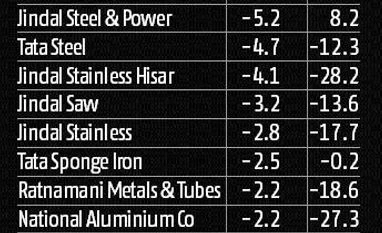As soon as Trump signed the proclamation, Tata Steel Europe asked the Dutch government and the European Union to persuade the US not to levy the duty on steel imports. “Time is running out, as the planned charges will take effect in two weeks. Together with our customers, we will urge the American government to make an exception for our products. Since we do not dump steel, our steel does not pose a threat to the national security of the US, and American companies depend on our steel,” said Theo Henrar, CEO of Tata Steel Netherlands.
Sajjan Jindal, chairman of JSW Steel, however, asked the government to impose similar tariffs on steel made overseas to protect Indian manufacturers.
The biggest worry for metal companies is that the protectionist measure by the US and potential counter-measures by other countries might hurt the steel industry globally, putting downward pressure on steel and aluminium prices, as manufacturers in Asia and the European Union scramble for newer markets. This might short-circuit the recent recovery in the volume growth and profitability of metal producers.

The combined market capitalisation of Indian metal producers is down nearly Rs 650 billion since the day Trump announced plans on March 1 to levy a tariff on steel and aluminium imports.
While the industry’s market capitalisation is down 6.5 per cent on average, steel producers such as SAIL, Tata Steel, and Jindal Steel and Power are down 10-14 per cent. Aluminium makers Hindalco and National Aluminium are down 8.5 per cent and 7 per cent, respectively, during the period.
Birla group-owned Hindalco’s subsidiary Novelis, which is based in the US, also warned that its costs would go up substantially as it was a consumer of imported aluminium. Analysts are expecting aluminum premiums to rise 38 per cent for Novelis. The premium is the amount added to the London Metal Exchange price for aluminum delivered to plans based in the US Midwest region, where Novelis has its plants.
Steve Fisher, CEO of Novelis Inc, said he did not support the tariff hike as it would lead to an increase in costs for the company. His comments came after Wilber Ross, US commerce secretary, played down the tariff hike, saying the cost of aluminium cans (made by Novelis/others) would rise by less than one cent per unit. “You can see it in many examples and you can play it down by a single can and make it sound insignificant. But when you do the math, about 88 billion cans, 17 million vehicles and all the steel and aluminum used across applications, it’s a significant inflation,” said Fisher. Novelis is diversifying its product portfolio to supply aluminium sheets for use in cars.
The latest move by the US Administration has created a rift between primary metal producers and their user industries. For example, automaker Mahindra & Mahindra Chairman Anand Mahindra does not want India to levy a retaliatory tariff on metal imports as, he says, it will vitiate the competition. “I am no believer in protectionism and enjoy competing globally but I believe India can stand tall in a trade war. If India retaliates with tariffs, the effect will be very different from what it was post-independence,” he tweeted.
Jindal of JSW Steel, on the other hand, said, “It is important for our policy makers to understand what countries like China, Korea and Japan are doing. While Japan's steel consumption is about 60 milliion tonnes per annum, it is producing about 110-120 mtpa.” These companies, Jindal said, were exporting about 50 per cent of their products overseas and never buy anything imported.
The Indian government reacted to Trump’s tariff hike, saying it will impact India to some extent. “The US is using security exceptions for tariff hike. We have to wait and see how they justify it,” Commerce Secretary Rita Teaotia said in New Delhi. The talk of tariff hike by the US, she said, had created “huge disturbances” and there was an outcry on tariff hike, as the US was doing it beyond World Trade Organization commitments.
(With inputs from Bloomberg)
To read the full story, Subscribe Now at just Rs 249 a month
Already a subscriber? Log in
Subscribe To BS Premium
₹249
Renews automatically
₹1699₹1999
Opt for auto renewal and save Rs. 300 Renews automatically
₹1999
What you get on BS Premium?
-
Unlock 30+ premium stories daily hand-picked by our editors, across devices on browser and app.
-
Pick your favourite companies, get a daily email with all news updates on them.
Full access to our intuitive epaper - clip, save, share articles from any device; newspaper archives from 2006.
Preferential invites to Business Standard events.
Curated newsletters on markets, personal finance, policy & politics, start-ups, technology, and more.
Need More Information - write to us at assist@bsmail.in



)